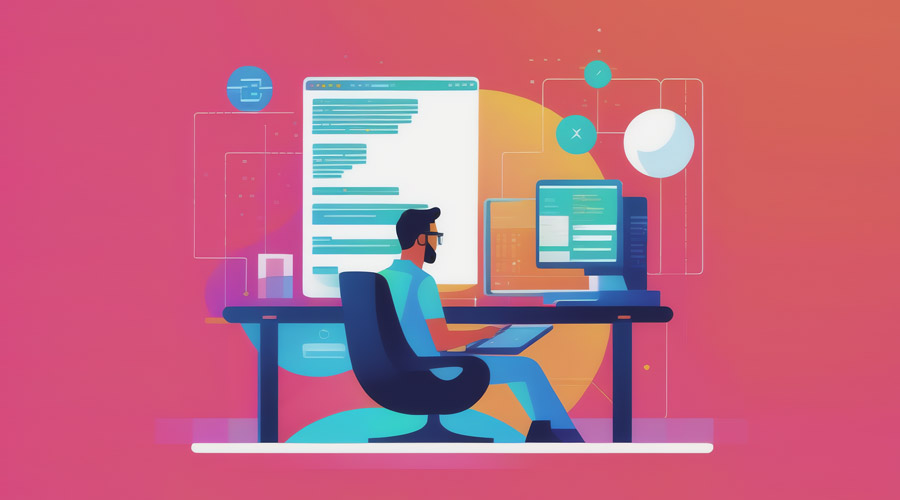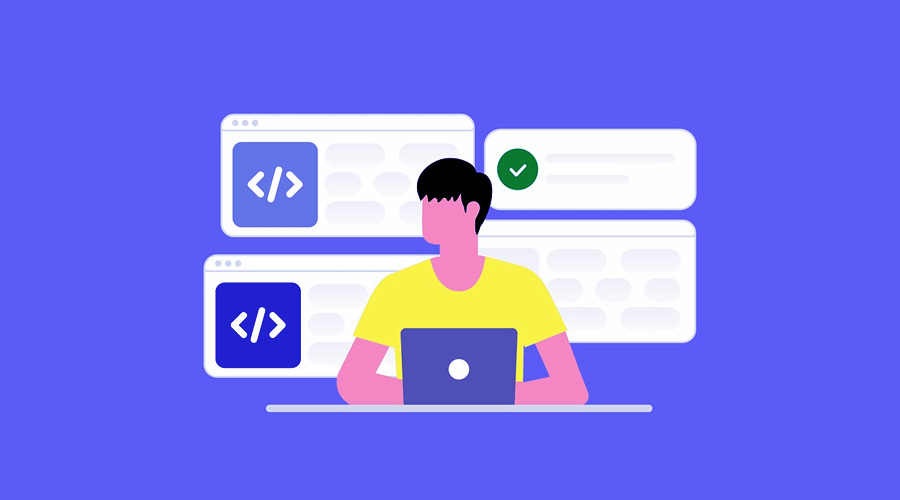Artificial Intelligence AI In Web Development By 2024: Its Uses And Working

Artificial intelligence (AI) has already been completely incorporated into the web development sector, and it is performing more difficult jobs. However, its value in web development is not often acknowledged or discussed. Additionally, you must comprehend how AI is changing the game if you want to work in web development.
The combination of AI development has a long history. AI began as a notion and evolved into a critical technology. Initially, it assisted with little chores such as evaluating data and typing the necessary instructions, but its potential has grown with time, and AI has now revolutionized how websites are created and viewed.
By 2024, creating websites using AI will have various advantages, such as enhanced user experiences, higher productivity, more intelligent automation, customized experiences, and data-driven decision-making. In the end, this increases competition and guarantees a high level of client happiness.
What precisely is artificial intelligence?
In the 1950s, the phrase “artificial intelligence” (AI) was first used to describe a machine’s capacity to do tasks that previously required human intellect. The evolution of this broad phrase is a result of technical research and development.
Today, AI, or Artificial intellect, refers to the emulation of human intellect in robots designed to do jobs that would normally need human intelligence. These activities include learning, thinking, problem-solving, perception, natural language comprehension, and adjusting to new settings.
How then does AI function in web development?
Artificial Intelligence (AI) uses machine learning algorithms to track user activity on your website and identify the kinds of people that frequent it. By tailoring offers, making product or service recommendations, and optimizing content for increased user engagement, these algorithms may learn from user behavior to constantly enhance the performance of your website. AI may also be utilized for predictive analysis, which enables you to know what a consumer wants even before they visit your website.
AI’s Effect on Web Development
The creation and maintenance of websites is being completely transformed by artificial intelligence. It helps web developers to create websites that are more dynamic, intelligent, and focused on the user. Here are a few important domains where AI is having a big influence:
- Enhancement of User Experience: Real-time, individualized interactions with users are made possible by chatbots and virtual assistants driven by AI, which makes websites more interactive and user-friendly.
- Material Creation: AI systems are capable of producing and refining material, keeping websites current and pertinent for their users.
- Automated Testing and Debugging: Artificial intelligence (AI) can find and address problems in the code, saving time and effort when it comes to quality control.
- Data analytics: By analyzing user behavior, artificial intelligence (AI) systems may assist web developers in customizing their websites to the preferences of their intended audience.
How is AI applied in Web Development?
Here are some concrete ways in which AI and web development complement one another.
Virtual assistants and chatbots
Users’ interactions with websites are evolving due to chatbots and virtual assistants. Chatbots are designed to understand human speech and react naturally. They may be used to answer common queries, automate tedious jobs, and point customers in the direction of what they need. Moreover, their ability to comprehend natural language enables them to react suitably to customer inquiries, irrespective of the terminology spoken. Based on a user’s past behavior, virtual AI assistants may offer personalized recommendations and ideas.
Security
The primary objective for web developers is to make websites secure, and AI plays an important role in achieving this goal. AI can examine website data to identify unusual patterns that may suggest a security compromise. AI techniques are also useful in finding coding flaws that hackers may exploit to get access to a website.
Additionally, AI can help detect fake accounts or fraudulent payments on a website. It may evaluate user activity and identify abnormalities that indicate fraud.
Personalized User Experiences
AI improves user experience (UX) by providing interactive features such as AI chatbots for speedy customer service and making websites easier to navigate. AI on social media sites makes recommendations for users to engage with in order to improve the service they get. Providing people with the material they want to view encourages them to stay on the website longer.
Dynamic Content Generation
It is possible to create personalized experiences for millions of individual consumers with AI-powered dynamic content customization. AI can utilize data to determine where a user is in the customer journey, identify their specific preferences, and design marketing campaigns with content that appeals to them.
Data Analysis and Insights
AI in web development can analyze enormous data sets, providing developers with valuable insights and supporting businesses in making educated decisions.
By reviewing and interpreting data on consumer behavior, website performance, and market trends, AI may give valuable suggestions for improving website design, enhancing user experience, and increasing overall efficiency.
Natural language processing (NLP)
In terms of AI applications in web development, natural language processing (NLP) is critical, notably in improving the effectiveness of search engines. It can provide tailored website suggestions based on client behavior and behaviors. This improves user engagement and conversion rates for websites.
SEO and Content
By evaluating search engine algorithms, finding keywords, and recommending adjustments to raise search ranks, artificial intelligence (AI) improves SEO tactics. AI systems can track rivals, keep an eye on a website’s performance, and suggest SEO tweaks to increase organic traffic.
Suggestions for E-Commerce
E-commerce websites may now provide personalized suggestions that are tailored to individual client needs thanks to artificial intelligence algorithms. Recommendation systems utilize past user behavior and interaction data to produce more relevant content for users to interact with. This enhances user experience overall and helps to boost engagement.
Optimization of Responsive Design
Websites may be made more responsive using AI, guaranteeing a smooth user experience on a variety of screens and devices. It gives developers the ability to design flexible layouts and dynamically modify information according to the capabilities and preferences of the user’s device.
Reduce Human errors
AI can reduce or completely eradicate mistakes or defects that arise from human carelessness or inaccuracy. How? By automating testing procedures, AI can more effectively find flaws and performance problems. In addition to reducing human error and ensuring improved software quality and stability, this also expedites the development cycle.
Improved Interaction Build User Trust
The designs of websites vary, and some may be difficult to navigate. AI-powered chatbots and virtual assistants provide real-time customer service by answering queries and helping consumers whenever they need it. They can handle a wide range of contacts, from simple inquiries to more difficult tasks, increasing customer satisfaction and lightening the strain on the support staff.
Common Challenges in Implementing AI for Web Development
Common issues come up when incorporating AI in web development, and they need to be resolved to make sure it works. Among them are:
Data Accessibility and Quality
For AI algorithms and analytics to function properly, high-quality data is required. AI won’t provide the intended results without it. But gathering data and getting it to the relevant people quickly is a challenge for a lot of businesses.
Upkeep and modifications
To continue to be useful, AI algorithms need to be updated and maintained on a regular basis. mistakes can emerge by neglecting maintenance, and mistakes can lead to wrong forecasts or results. Additionally, when new information becomes available and as consumer behavior evolves over time, AI models must be continuously assessed.
Future of AI in Web Development
After reading this article, we hope you feel more confident about using AI in web development. However, each technology has a life cycle and is ultimately replaced by more evolved versions. So, what does AI’s future in web development look like?
The future of AI in web development seems exciting and disruptive. AI technology will continue to transform online experiences, providing more customized and dynamic interactions while easing development processes through automated testing and content production.
The integration of AI with web development produces creative and user-friendly solutions. Nearly half of web developers use AI tools to speed design and development processes.
Overall, we can say that AI can turn any company concept into a fantastic digital service.
The Bottom Line
AI in web development is a strong technology that may help your company expand while providing exceptional user experiences. However, there are a few traps to avoid. If you’re thinking about adopting AI for web development, do your study first to understand what you’re getting into.
Don’t forget that AI is an excellent tool for dealing with repetitive chores, providing individualized user experiences, and doing rapid data analysis and natural language processing. Web developers employ artificial intelligence development to create strong, user-friendly websites. They can incorporate appealing features like voice-based searches and rapid customer assistance.
AI technologies also facilitate the study of user behavior. Artificial intelligence can analyze large amounts of data and determine what kinds of materials are most popular. High user engagement requires this strategy in addition to a wide range of interactive components.




